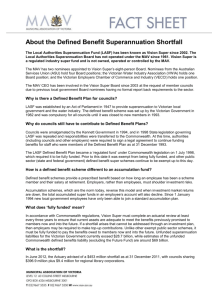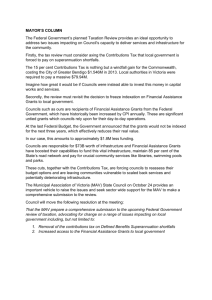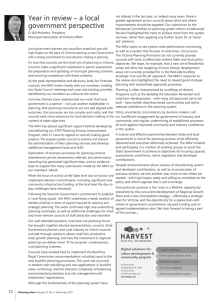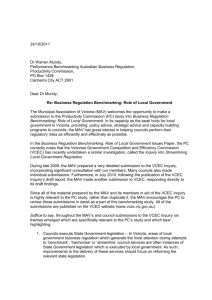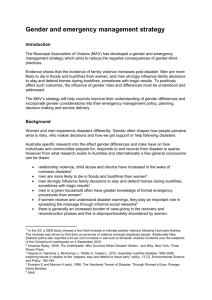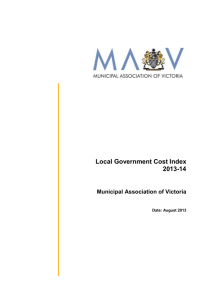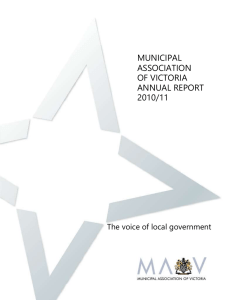Defined benefit superannuation scheme members brief 2012 (Word
advertisement
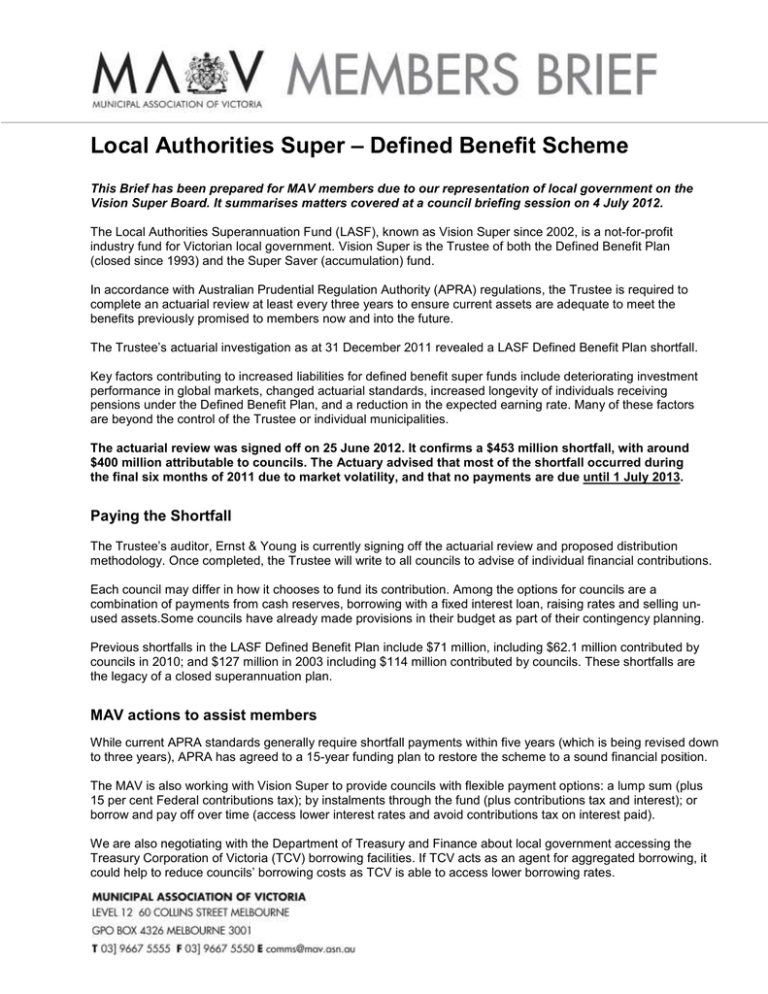
Local Authorities Super – Defined Benefit Scheme This Brief has been prepared for MAV members due to our representation of local government on the Vision Super Board. It summarises matters covered at a council briefing session on 4 July 2012. The Local Authorities Superannuation Fund (LASF), known as Vision Super since 2002, is a not-for-profit industry fund for Victorian local government. Vision Super is the Trustee of both the Defined Benefit Plan (closed since 1993) and the Super Saver (accumulation) fund. In accordance with Australian Prudential Regulation Authority (APRA) regulations, the Trustee is required to complete an actuarial review at least every three years to ensure current assets are adequate to meet the benefits previously promised to members now and into the future. The Trustee’s actuarial investigation as at 31 December 2011 revealed a LASF Defined Benefit Plan shortfall. Key factors contributing to increased liabilities for defined benefit super funds include deteriorating investment performance in global markets, changed actuarial standards, increased longevity of individuals receiving pensions under the Defined Benefit Plan, and a reduction in the expected earning rate. Many of these factors are beyond the control of the Trustee or individual municipalities. The actuarial review was signed off on 25 June 2012. It confirms a $453 million shortfall, with around $400 million attributable to councils. The Actuary advised that most of the shortfall occurred during the final six months of 2011 due to market volatility, and that no payments are due until 1 July 2013. Paying the Shortfall The Trustee’s auditor, Ernst & Young is currently signing off the actuarial review and proposed distribution methodology. Once completed, the Trustee will write to all councils to advise of individual financial contributions. Each council may differ in how it chooses to fund its contribution. Among the options for councils are a combination of payments from cash reserves, borrowing with a fixed interest loan, raising rates and selling unused assets.Some councils have already made provisions in their budget as part of their contingency planning. Previous shortfalls in the LASF Defined Benefit Plan include $71 million, including $62.1 million contributed by councils in 2010; and $127 million in 2003 including $114 million contributed by councils. These shortfalls are the legacy of a closed superannuation plan. MAV actions to assist members While current APRA standards generally require shortfall payments within five years (which is being revised down to three years), APRA has agreed to a 15-year funding plan to restore the scheme to a sound financial position. The MAV is also working with Vision Super to provide councils with flexible payment options: a lump sum (plus 15 per cent Federal contributions tax); by instalments through the fund (plus contributions tax and interest); or borrow and pay off over time (access lower interest rates and avoid contributions tax on interest paid). We are also negotiating with the Department of Treasury and Finance about local government accessing the Treasury Corporation of Victoria (TCV) borrowing facilities. If TCV acts as an agent for aggregated borrowing, it could help to reduce councils’ borrowing costs as TCV is able to access lower borrowing rates. In addition, the MAV is investigating a local government bond issue to access lower interest rates. About Defined Benefit Schemes Defined benefit schemes provide a prescribed retirement benefit based on how many years an employee has been a scheme member and their salary at retirement. They also require the employer, rather than employees, to shoulder the investment risk. This is in contrast to accumulation schemes, which are the norm today. All levels of government in Australia have at some time offered defined benefit schemes as an incentive for employees otherwise attracted by the higher salaries and employment conditions offered in the private sector. Local government’s defined benefit scheme must have sufficient funds to meet the benefits owed to members through a combination of authority contributions, member contributions and the fund’s investment returns. Neither the federal nor state governments are required to fully fund their defined benefit scheme liabilities. The Victorian Government’s current unfunded liabilities exceed $29 billion, growing by more than 40.6 per cent since 2009-10. The Commonwealth’s defined benefits liability (net of the Future Fund) is around $76.6 billion. About the LASF Defined Benefit Plan LASF was established by an Act of Parliament in 1947 to provide superannuation for Victorian local government and the water industry. The Local Authorities Superannuation Board has been Trustee throughout. When the Victorian Government set up the defined benefit scheme in 1982, it was compulsory for all councils. When the scheme was transferred to the Commonwealth in 1998, new legislation required it to be fully funded (under previous State legislation unfunded liabilities were acceptable). The local government LASF Defined Benefit Plan closed to new members in 1993. At that time there were almost 38,000 defined benefit members and 7,500 lifetime pensioners. By December 2002 this had reduced to 9,544 active members and 6,440 pensioners. In December 2011, there were 4,949 defined benefit members still working for authorities (with an average age of 54 years) and 5,132 lifetime pensioners (with an average age of 79 years). Membership, and the liability of authorities will continue to reduce over time as defined benefit members retire and pensioners pass away. By 2031, the actuary estimates that there will be 205 working defined benefit members and 2,420 remaining pensioners. The estimated value of benefits payable to members and pensioners is currently around $1.9 billion. This is projected to fall to $425 million over the next 20 years. The MAV is represented on the Vision Super Board by the MAV CEO Rob Spence and Cr Geoff Lake. Further Information MAV Contact: Owen Harvey-Beavis, oharvey-beavis@mav.asn.au.

